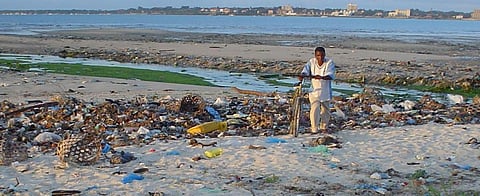African countries need to clean up their act on industrial pollution
In African countries, a large amount of contaminants in the environment are generated by industrial operations. Contaminants can reach water resources, both surface and underground waters, by the emission of gaseous, liquid and solid materials from different industries.
These days, water pollution from the disposal of industrial wastewater is becoming an environmental concern in Addis Ababa. The city is the capital of Ethiopia and it has 65 per cent (2,000) of industries of the country.
Since the city has inadequate and inefficient solid and liquid waste management facilities, all point and non-point sources in it discharge their effluents directly into the closest surface water drain or river without any treatment.
And solid waste generated by industries is often disposed off in open spaces, from where it is washed by runoff during rains and flows into rivers and seeps into shallow groundwater.
About 90 per cent of industries do not have any kind of treatment plant and discharge their solid and liquid wastes untreated into the environment. Rivers in Addis Ababa are contaminated with heavy metals due to different industrial waste.
Food and textile industries take the lion’s share in releasing water pollutants in Ethiopia. Chromium, sulphides, ammonium salts, chlorides and sodium hydroxide are the major pollutants that are discharged into rivers from these industries.
Addis Ababa generates an estimated annual volume of 49 million cubic metres of wastewater from which, about four million cubic metres is industrial wastewater.
In Ethiopia, many large and medium-scale manufacturing industries have a primary level of treatment plant. These primary-level treatment plants do not function regularly and are built to avoid penalties in the course of an inspection by Environment Protection Authority (EPA) organs.
Only a few industries recycle their process water, which is badly polluted with toxic chemicals. The major reasons for the absence of recycling process water are deficient capacity, inadequate infrastructure and lack of facility, expertise and financial resources, in addition to the lack of enforceable effluent quality standards which is only in the draft stage in Ethiopia, with recommended guidelines.
Ghana and Tanzania
In Ghana, about 60 per cent of water bodies are polluted, with many in a critical condition, according to the executive secretary of the country’s Water Resources Commission, Ben Yaw Ampomah. Apart from illegal mining activities, industrial waste, household disposals and farming were the major causes of water pollution in the country, Ampomah has said.
In Ghana, the manufacturing industries are mostly located in Tema, which also called the industrial city of the country and in Tanzania, 80 per cent of industries are located in urban areas and 50 per cent of these are located in major urban areas like Dar es Salaam city and a few other towns.
And in both countries, most industries are discharging their effluents directly into the surface water bodies without any treatment.
In Tanzania, the Msimbazi and Creek rivers are the most polluted water bodies in Dar es Salaam. These rivers receive large quantities of partially treated or untreated industrial wastes from various industries. Hence, they are heavily polluted.
The major pollutants that are discharged into rivers are dyes, strong alkalis from textile factories and organic wastes from breweries. The volume of wastewater generated by industries is 683,717 cubic metres per day.
Industrial wastewater discharge contributes an estimated 2,715 tonnes per year of Biochemical Oxygen Demand and 15,454 tonnes per year of suspended solids to the marine environment. Food processing and textile industries are the major water polluting industries in Tanzania and Ghana.
In Ghana and Tanzania, facilities for effluent treatment are rudimentary. Very few industries have a primary and secondary level of the treatment facility and discharging treated effluents.
Treatment of effluents is very expensive and impacts negatively on the profits of industries. This is one of the main reasons why most industries are reluctant to treat their wastewater and simply release them into the environment.
This damages numerous coastal, river and marine ecosystems and triggers the transmission of contagious diseases among people.
Strategic key issues
- National Baseline data: Lack of aggregated data on wastewater management status, like in Ghana, no data exist on industrial wastewater production.
- Wastewater treatment facilities, especially, low-cost technologies are lacking the need for skill development in the area of low-cost treatment technologies.
- Lack of access and monitoring of effluent.
- Lack of regulatory standards enforcement.
- Lack of guidelines, standards and manuals that helps to support the implementation.
Industrial effluents must be treated efficiently before they are released into the environment in order to prevent any harm or the risks they may have on the environment and human health.
Enforcement of water and environmental laws must be in place to protect the environment. There should be strict policy implementation regarding different industrial effluents. Sector-specific guidelines are a must for industries to avoid the contamination of river waters.
There should be a strong structure for monitoring effluent disposal. In Ethiopia, the development of a comprehensive effluent quality standards is very important as it is in the draft stage.


